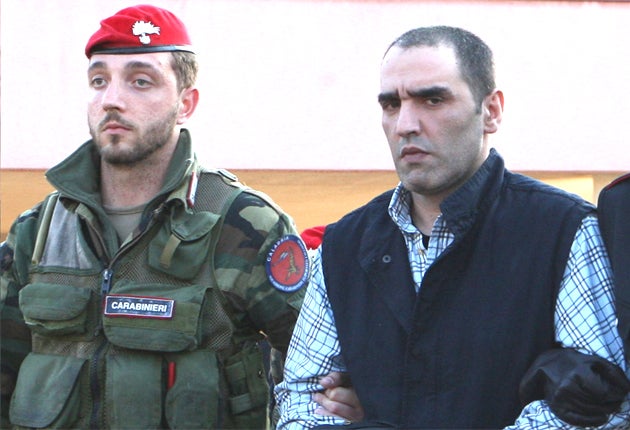As Italian firms fall victim to the recession, Mafia fills the void

Your support helps us to tell the story
From reproductive rights to climate change to Big Tech, The Independent is on the ground when the story is developing. Whether it's investigating the financials of Elon Musk's pro-Trump PAC or producing our latest documentary, 'The A Word', which shines a light on the American women fighting for reproductive rights, we know how important it is to parse out the facts from the messaging.
At such a critical moment in US history, we need reporters on the ground. Your donation allows us to keep sending journalists to speak to both sides of the story.
The Independent is trusted by Americans across the entire political spectrum. And unlike many other quality news outlets, we choose not to lock Americans out of our reporting and analysis with paywalls. We believe quality journalism should be available to everyone, paid for by those who can afford it.
Your support makes all the difference.Italy's feared mobs are taking advantage of the recession by moving from their traditional southern strongholds to buy up legitimate businesses in the country's rich north to launder their vast earnings from cocaine and extortion rackets, anti-mafia judges have told The Independent.
One magistrate said yesterday that mobsters from 'Ndrangheta, Italy's biggest crime syndicate, were investing in respectable businesses from construction firms to pizza restaurants.
Magistrates say that the climate of fear is such that only three of 50 victims of an extortion racket have agreed to appear in court for a major trial next week of 39 suspected mafiosi and their associates. If they appeared, they would be eligible for compensation.
"This shows that the mafia is here in the north of Italy in a big way and that people are very frightened," the prosecuting magistrate Mario Venditti said.
Prosecutors have uncovered an area near Milan's Malpensa airport where members of 'Ndrangheta had a virtual monopoly on supplying services and goods for construction projects. Companies and individuals that did not "choose" mob services were threatened with violence in the multimillion-euro racket that was also thought to involve local politicians.
Mr Venditti said that attempts were being made to persuade more of the 50 victims to step forward. "Ultimately to make headway we need the public to get involved. But people are really frightened, and this is not going to be easy."
Much of the prosecution's case relies on wiretaps, use of which, he noted, the government of Silvio Berlusconi is trying to restrict. The 39 facing trial are alleged members or associates of the Marina Cirò gang, headed by the Farao-Maricola families, which had created a zone running from the north of Milan to the south of Varese, with virtually unchecked extortion, loan sharking and robbery.
Another Milan magistrate, Alberto Nobili, earlier warned that 'Ndrangheta, which has its roots in the Calabria region, was increasingly looking to expand its operations into the rich north. He believes that around 1,000 operatives of the 'Ndrangheta are active in Milan and surrounding areas. At least one 'Ndrangheta clan, the Mancuso family, is thought to have bought heavily into the restaurant trade in the picturesque lake district, north of the city, which is popular with tourists.
The possibility of an even bigger prize for ambitious mobsters has been raised by revelations that investigators have been probing some figures in Milan's famed fashion business to see how huge new property purchases have been possible during a major recession.
Leaders of industry associations, such as Assimpredil, have warned that the financial crisis has made it easier for organised crime to buy its way into legitimate business as firms struggle to get credit by ordinary means.
Such activity would also enable mobsters to gain control over companies which were likely to bid for contracts relating to the 2015 Expo World Fair, for which €15bn (£12.5bn) is flooding into the city and surrounding region.
Despite its size and the scale of its reach, 'Ndrangheta has remained relatively obscure for a crime syndicate with a turnover of £30bn, which rules Europe's cocaine trade. It came to greatest prominence in Duisburg in 2007, when an internal feud saw six members of the Nirta-Strangio family gunned down by the rival Pelle-Romeo clan in front of a pizza restaurant.
Ahead of next week's trial some local people said they felt "liberated" after the mobsters were arrested. One person from the town of Lonate Pozzolo, who wished to remain anonymous, told the local Varese Notizie newspaper: "We feel this liberation more than the liberation from Nazi-Fascism. We went through a really terrible time. People started moving away to escape the harassment and abuse."
Join our commenting forum
Join thought-provoking conversations, follow other Independent readers and see their replies
Comments